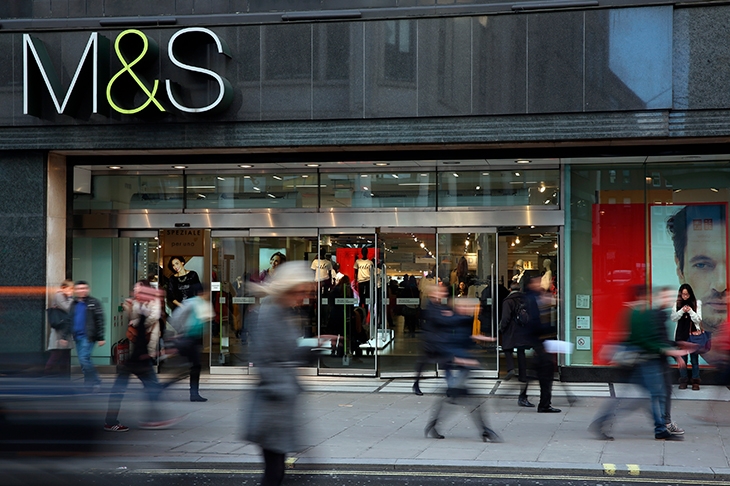When I wrote last week about business-to-business pain-sharing for survival, I was naturally thinking first about UK companies. I say ‘naturally’ because in every aspect of this crisis, national interest has, as it were, trumped transnational co-operation. That’s particularly the case where medical supplies are concerned — as in the US President’s attempt to stop the Minnesota-based manufacturer 3M exporting respirator masks to Canada. But wider questions about global supply chains have been brought into focus by one vivid case: the wipe-out of fashion orders from factories in Bangladesh, Cambodia and Vietnam, whose operatives — low-paid but lifted by their jobs out of greater poverty — are the flagbearers of globalisation en masse.
Bangladesh’s four million garment workers account for 84 per cent of their country’s exports, but most factories there are now closed. How should western retailers respond, given that their own shops face ‘high-street Armageddon’ with jobs at risk, warehouses full and cashflows breaking? There’s a range of answers so far. Sir Philip Green’s Arcadia group is reported to have suspended orders, extended payment terms and slashed the prices it will pay for goods already in transit. Matalan and Primark have cancelled much bigger shipments but the latter — owned by the billionaire Weston family — has offered to fund related factory wages. The Swedish group H&M says it’s paying in full for outstanding orders, declaring that ‘our long-term commitment to suppliers remains intact’.
It would be unworldly to heap shame on any retailer today for not placing new orders that can’t be sold. But there’s a reminder in H&M’s position of an out-of-fashion business model I’ve often praised, namely that of pre-21st century Marks & Spencer, whose suppliers had to meet tough standards and prices but were nurtured as part of an extended family. When normality returns, many supply lines will be shortened and localised; but that won’t help the far-away workers of Bangladesh, who need a revival of globalised trade on the basis of relationships that might apply if the buyers were their closest neighbours and cousins.
Eastern menace
‘Huawei go again’ is a gag I’ve used before — but the suitability of the Chinese telecoms giant to provide the UK’s 5G infrastructure is an issue that’s not going away. We’re told Huawei kit (to be used only in ‘non-core’ areas) is the best available — and that we’ll need super-efficient broadband more than ever in an extended period of restrictions until Covid-19 is defeated. The government also needs unprecedented access to personal data to track infection, and we can be sure the Chinese know better than anyone how to do that. But we trust them less than ever because of the way they have propagandised their own epidemic, while there’s a growing fear that the western slump will be matched by a ruthless economic power grab from the East.
Responding to China-sceptic MPs, Huawei’s UK chief Victor Zhang pointed out in an open letter this week that home data use has soared by 50 per cent since the crisis hit, that Huawei is ‘helping keep Britain online’ by boosting equipment supply, and that ‘disrupting our involvement in the 5G rollout would do Britain a disservice’. He’s probably not wrong — but it’s one more uncomfortable compromise forced on us by a far more sinister menace than the tentacles of Chinese state surveillance.
Our recovery portfolio
Denied the pleasure of lunch with this column’s veteran investor, Robin Andrews, I asked him instead to come up with a ‘pandemic recovery portfolio’: companies strong enough to survive a severe recession, with products to suit new patterns of life and commerce thereafter. Readers’ suggestions are welcome too (martin@spectator.co.uk). In this first selection, we’ve left aside Covid-19 bioscience plays, which we’ll look at another week. The brave may find fortune there, but as Robin says, ‘any small company that hints at research relevant to a test or cure attracts immediate speculative interest’ while even real winners will need at least a year’s ‘cash runway’ to reach commercial breakthrough.
Much easier to understand are businesses such as Cranswick, a huge domestic producer of pork products, and the bakery group Finsbury, both of which stand to do well in a return to value-for-money, homegrown eating. DS Smith is a manufacturer of cardboard packaging that’s benefiting from the online shopping bonanza, and Eddie Stobart Logistics is the UK’s most famous trucking business but with a share price depressed by corporate shenanigans, so could have upside potential.
Scotgold is the UK’s only near-producing gold mine, albeit a small one whose production has been delayed by lockdown, but safe-haven gold itself is already up 20 per cent this year. And in the non-virus medical field, Concepta is an Aim-listed company making products to assist women with fertility problems: could a recovery in which many couples are still stuck at home be a boom time for making babies?
Free pheasant
On the theme of lockdown cuisine, I persuaded myself it would be OK to shoot one of the many out-of-season pheasants that graze my garden, rather than deny a more deserving shopper the last chicken in the butcher’s cabinet. So I took a potshot with the airgun at a straggly old cock bird who was eating my choicest buds. But I did him no damage — and moments later he took off, caught a gust of wind and smashed through a window to cause mayhem in the spare bedroom. I ran upstairs, rugby-tackled him and was about to ring his neck with faisan chasseur in mind — but relented and set him free. I had remembered Philip Larkin’s line about a hedgehog killed by a mower: ‘We should be careful/ Of each other, we should be kind/ While there is still time.’







Comments